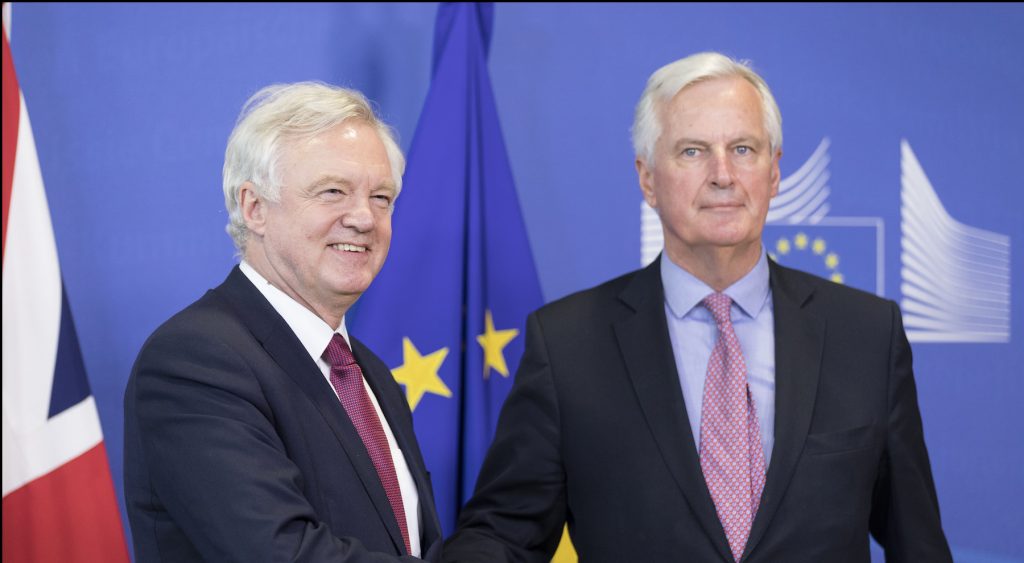
A dictionary of Brexit gobbledygook
Brexit is on. The UK and the EU negotiators are going to spend the next two years sat in a room in Brussels trying to work out how the UK is going to leave the EU.
And it looks like they might finally be getting there. Theresa May told other MPs yesterday that the kind of deal she'd reached yesterday would make all voters happy: leave voters will be relieved talks are moving forward and remain voters will be happy the UK is now less likely to crash out of the EU without a deal.
But we've still got a couple more years of this, so as another round of talks comes to an end we thought we'd put together a handy guide to the words and phrases you’re going to be hearing over and over (and over) again in the next few years. We'll update this as the negotiations go on (and on, and on...)
As always, if you hear anything you want explained and we haven't yet, tweet us, or drop us an email.
Divorce Bill
This is the other kind of bill (how much it's all gonna cost). The UK needs to give the EU money for things it committed to before it decided to leave the party. Think of it like this: you plan a holiday with five friends and calculate how much it's all going to cost based on that, then one pulls out just before you pay the bill – it's suddenly all a lot more expensive for everyone else.
The UK and the EU have kind of agreed on a figure of around £35 billion. That's a huge sum of money, but a lot less than was previously being flung around.
Northern Ireland border (the)
Northern Ireland’s been big news in the UK recently, and it’s probably going to stay that way. Ireland is split in two – the Republic of Ireland isn’t part of the UK but it is part of the EU and will stay part of the EU when the UK leaves, while Northern Ireland is part of the UK, and will leave.
The border between the two countries is the UK’s only land border. At the moment, because both countries are part of the EU, people and goods can travel across that border without any hassle – that’s a really important part of the relationship between the two countries, and for the people that live there.
If there’s a hard Brexit and that ‘freedom of movement’ goes, no one really knows what would happen for Ireland and Northern Ireland.
5th round of Brexit talks
Beginning on October 9, Brexit Minister David Davis met with EU negotiators in Brussels, for the 5th time since the referendum, to talk about nothing but Brexit.
Once again, nothing happened... and it’s going to remain (lol) that way until December. This is when more discussions will be held that hopefully won’t end in a stalemate (but don’t hold your breath).
We're supposed to be exiting the EU in March of 2019. But talks just can’t seem to get anywhere. And as 2017 nears its end, pressure is mounting to actually talk about the future relationship of the two sides. Is that asking too much?
See also: Brexit deadlock

Article 50
If you look up the actual Article 50, all it really says is “voluntary withdrawal from the Union”. It’s just the rule in the treaty that ties the EU together (the Lisbon Treaty) that allows a country to leave.
It was only written in 2007 – which means leaving the EU wasn’t even really a possibility until then. In other words, it’s never happened before, they didn’t even consider it would happen, and no-one knows how the rule will hold up. Greaaat!
Bombardier
Bombardier is a Canadian based manufacturer of planes and trains. Right now, they're going head-to-head with United States’ Boeing, a rival aerospace company.
Boeing decided to tattle on Bombardier to the United States government, claiming that the Canadian company was using unfair trading practices. Trump's administration took Boeing’s side and slapped a giant 300% tariff on Bombardier’s jets. Looks like Canada and the U.S. aren’t such friendly neighbors anymore.
But I’m confused… what does a fight between Canada and America have to do with Brexit? Well, Bombardier has a location in Northern Ireland and the jets being tariffed currently employ 1,000 people there. So this tariff could mean 1,000 lost jobs.
Theresa May has put her two cents in, saying that she is "bitterly disappointed" and is threatening a trade war with the U.S. In other words, the U.K. is threatening to respond to Trump’s tariffs by completely slashing British defense contracts with Boeing. And Trump would NOT be happy. Meaning longer term implications for ties between the U.S. and the U.K.
Which is kind of scary considering that on the post-Brexit agenda, the U.K. was planning on turning straight to the U.S. for a new trade agreement. Some are arguing that this fiasco is a taste of the U.K.’s future without the EU… doesn't taste too good.
Brexit deadlock
It’s been over a year since the referendum to leave the EU. But somehow, it feels like next to no progress has been made. In the 5th round of Brexit talks that began on October 9, the two sides put the brakes on moving forward with negotiations because they STILL couldn’t agree on the divorce bill.
There can’t be a discussion on what will happen to the post-Brexit relationship between the two sides until this is settled. And when it comes to money, neither side is willing to budge. So here we are, in the same exact place we started when the vote first happened. The risks of a “no deal” keep getting higher and higher.
See also: 5th round of Brexit Talks, No deal AKA the Cliff Edge
Citizen’s rights
Ok, so this one’s kind of a bit more self-explanatory, but is going to play a big role in the negotiations. It’s all about what’s going to happen to EU citizens living in the UK (or UK citizens living in the EU). Can they stay? Can they travel? Can they work? Who knows... yet.
Conservative Party Conference/Theresa May’s Cough Attack
We’ve all had an embarrassing cough attacks that comes at the most inconvenient time. Theresa May can relate. At the Conservative party conference held in early October, Theresa May struggled to make out words as she was plagued by a strike to the throat.
But why is there so much hype about May’s respiratory system? Well, a personal speech that was intended to offer inspirational insights into achieving “the British dream” was overshadowed by all the hacking. May wanted to use the speech to rally public support for her leadership. What she got was a glass of water and a cough lozenge.
David Cameron
The Prime Minister of the U.K. before Theresa May. He was a huge advocate for staying in the European Union, claiming that Britain’s economy would essentially self-destruct if it exited.
But under pressure from Parliament, the Conservative leader held the referendum to decide Great Britain’s fate in the EU. Cameron took an “L” when the results came in with Britain voting to leave. Shortly after, Cameron said “sayonara” as he resigned from his role as Prime Minister.
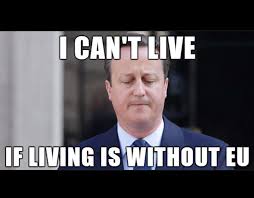
Eurocrat
European Beaurocrats! Clever old British press. This is a word used to describe the civil servants and officials working for the EU who are likely to be involved in the discussions. Top tip: it’s normally used by people who don’t like them very much. If you see someone using it, it's fairly likely they're not the biggest EU fan.
Free Trade Deal
This is basically just a term being used to describe the deal that's going to allow trade between the EU and the UK, but how 'free' it is, we don't really know yet. 'Free' would basically mean no restrictions on what the two countries can trade with each other and how, and no extra charges for buying products from each other.
But the EU is hesitant to make it too free, otherwise it undermines the whole point of being part of the EU in the first place. It could take years to work it out (read: it probably will).
Great Repeal Bill (the)
One to make your head hurt. This is another bit of law that basically means that all the thousands of EU laws that currently exist in the UK will just be automatically copied into UK law once it leaves, then the UK can start changing (or repealing) the ones it doesn’t like so much.
Hard Brexit
Hard, soft, poached, scrambled – how do you like your Brexit?
Hard Brexit is the equivalent of breaking up with someone, deleting their number, blocking them on Facebook and never seeing them again. The UK would be on its own, outside of the 'single market' – in other words, no longer in a special agreement with other EU countries that makes trade and business easier – and negotiating one-on-one deals with each country to figure out how their relationship will work.
See also: Soft Brexit, Cliff Edge
Jeremy Corbyn
Leader of the Labour Party (the party that’s not in power) (sorry Corbz). He’s been the talk of town recently for saying that if another referendum was held today, he would vote to remain in the EU. I’m confused. Why is this headline news? Well, people admire his words. Because he uses them. And doesn’t remain silent. Like someone else we know (cough cough, Theresa May).
See also: Theresa Maybe, Conservative Party Conference/Theresa May’s Cough Attack
No deal AKA the Cliff Edge
Ah, the Cliff Edge. Fills you with confidence doesn’t it? It just sounds sooo safe. So what’s it all about?
What feels like a million years ago, just after the actual Brexit vote, the UK Prime Minister played hard ball. The UK wouldn’t be taking any sh*t from anyone, she said (not quite like that). She’d rather walk out with no deal on trade and the UK’s future relationship than one that’s bad for Britain.
The thing is, the UK does already have a deal with the EU. Both are members of the World Trade Organization (WTO) which means there are basic rules that apply to trading with them, they're just not as beneficial to either side as EU membership. The cliff, we assume, is just about stepping off ‘the edge’ and leaving the EU without any certainty about what’s going to happen.
The main sticking points in the deal are likely to be around the trade agreement the UK has with the EU – it can import and export goods without paying charges, and UK businesses are pretty keen on keeping that arrangement. There’s been a bit of a change of heart on that one, and the prospect of no deal and that cliff edge now seems like it might be a bit worse than a bad one. They’re going for a good deal for everyone now, apparently.
See also: Soft Brexit, Hard Brexit
Referendum
The reason why “Brexit” was added to your political vocabulary. A referendum is basically a vote that is held on a single issue in order to gauge the public’s opinion. The Brexit one was held on June 23, 2016 to determine if the public wanted to leave or remain in the EU.
The results were seriously close, with 51.9% voting to leave and 48.1% voting to remain. The whole thing has been very, very, very controversial. There’s no constitutional requirement to follow what a referendum says, which means Parliament does not legally have to go through with Brexit. And a lot of people, particularly economists, are claiming it was a HUGE mistake.
It has been and will continue to be a very bumpy ride to March of 2019, when the UK is expected to officially “divorce” the EU. And never ever ever, get back together.
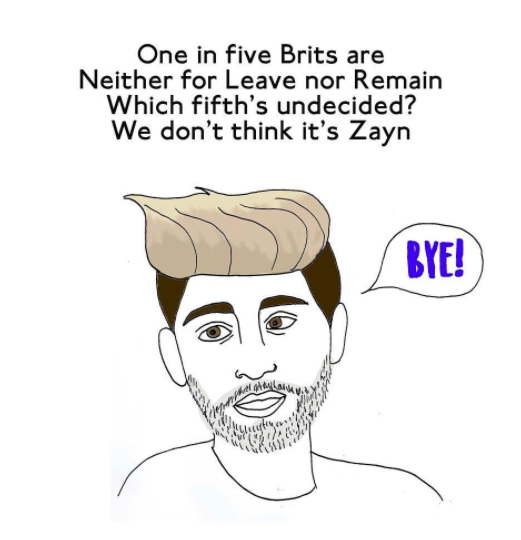
Secret reports…
Campaigners from the Good Law Project want the go-to-guy for all things Brexit, David Davis, to publish some oh so secret reports that have to do with Brexit, or else. The reports that the Good Law Project is talking about reveal findings into how leaving the EU is going to affect different parts of the economy (a.k.a. jobs and living standards). The campaigners have the support of over 120 members of Parliament, who signed a letter that demands Davis to publish the reports.
...and secret advice
At the same time, Theresa May is being called to publish secret advice that was given to her by top legal experts. What’s the advice? Well, we don’t exactly know but we’re pretty sure it has to do with information about how Parliament could stop Brexit. As in, there’s a legal way that Parliament could stop Brexit from happening in March of 2019 if it decides that doing so is in the best interest of the nation. Kind of seems like something the public would want to know.
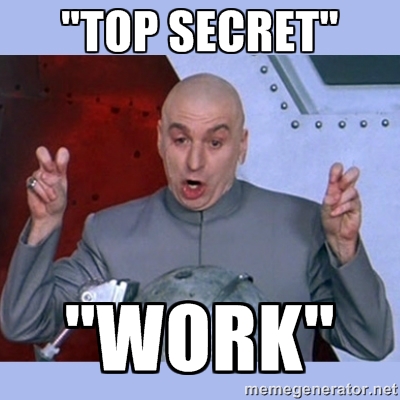
Soft Brexit
Pretty unsurprisingly, this is the opposite of ‘Hard Brexit’. It’s a deal that would probably involve maintaining trade agreements, and keeping up a lot of the features of EU membership – traveling freely around the EU, for example.
See also: Hard Brexit, Strong and Special Partnership
Single market
A group of countries (e.g. countries in the EU) who can freely trade and do business with each other. 'Free trade' just means they don't add any extra charges to products bought from each other's countries. Now that Brexit has happened, the UK is out of the 'single market'... unless they manage to negotiate some way of staying in, but it doesn't look like they want to / will be allowed to.
Strong and special relationship
David Davis, the UK politician in charge of the negotiations, is getting all pally with his opposites on the EU’s side of the table. He’s saying that whatever happens, this will be the future of the relationship. Let’s still be friends, he’s saying, special friends...
Theresa (Call me)“Maybe”
When the Brexit referendum was first held in June of 2016, Theresa May voted to stay in the EU. But then David Cameron resigned, May took over and had a change of heart. The people of Great Britain had spoken and the new Prime Minister was now gung-ho Brexit…
...Or so it seemed. In a radio interview with LBC on October 10, May was asked if she’d vote for Brexit if another referendum was held. She wouldn’t say (cue the crickets).Things aren’t looking too great for the PM as she struggles to negotiate a deal for Brexit. And her reputation among her Tory colleagues isn’t looking too hot either.
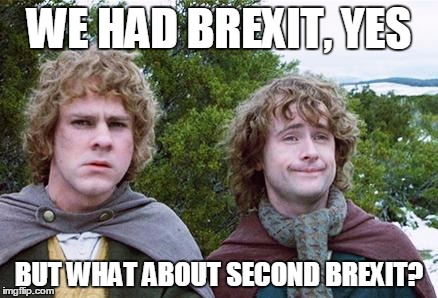
Transitional arrangement
A temporary deal between the end of one deal and the start of another – or to stop the UK falling off that cliff if there isn’t really a deal after all. Basically it’ll be will be a set of arrangements that will bridge the gap when the Article 50 negotiations end and the UK leaves the EU and before any trade agreements start.



